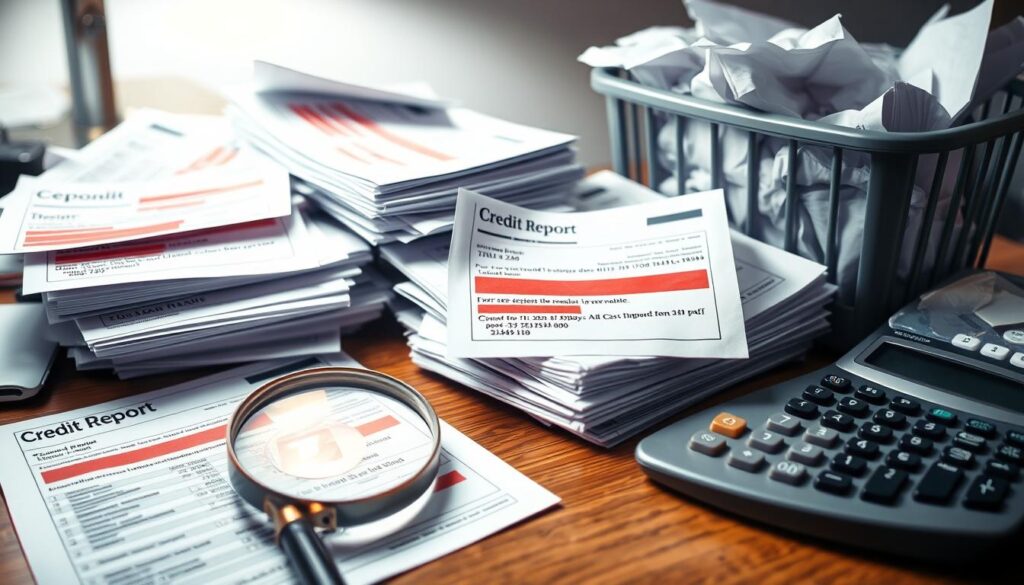Our financial lives are deeply tied to digital records. Credit reports play a crucial role in this interconnected world. Mistakes in these reports can seriously impact our future opportunities.
A credit inaccuracy attorney can be your guide through this complex situation. They help protect your rights and ensure your credit report is accurate.
These experts know the ins and outs of consumer credit laws. They’re well-versed in the Fair Credit Reporting Act (FCRA). With their help, you can tackle issues like wrong information or identity theft.
Key Takeaways
- Understand the importance of accurate credit reports and the potential consequences of credit report errors.
- Learn about your rights under the Fair Credit Reporting Act and how a credit inaccuracy attorney can help you exercise them.
- Discover the most common types of credit report inaccuracies and how to address them.
- Explore the process of disputing credit report errors and the role of a credit inaccuracy attorney in navigating the complex legal landscape.
- Gain insight into the cost of hiring a credit inaccuracy attorney and the potential benefits of their services.
The Importance of Accurate Credit Reports
Credit reports shape our financial lives. They show how trustworthy we are with money. Lenders, landlords, and employers use them to make decisions about us.
Keeping these reports accurate is crucial. Errors can harm our financial future. Regular checks help us spot and fix mistakes quickly.
Consequences of Credit Report Errors
Credit report mistakes can cause serious problems. You might be denied loans or credit cards. Higher interest rates could cost you more money.
These errors may even hurt your job search. Landlords might reject your rental applications. Quick action is key to fixing these issues.
Understanding Your Rights Under the Fair Credit Reporting Act
The Fair Credit Reporting Act (FCRA) protects consumers from credit report errors. It gives you the right to dispute mistakes.
You can get your credit report for free. The FCRA lets you check it regularly. This helps protect your consumer rights.
| Key Provisions of the Fair Credit Reporting Act | Description |
|---|---|
| Access to Credit Reports | Consumers have the right to access their credit reports for free once per year from each of the three major credit bureaus. |
| Dispute Process | Consumers can dispute inaccuracies on their credit reports, and credit bureaus are required to investigate and correct any errors. |
| Consent for Credit Checks | Consumers must provide consent before their credit information can be accessed for certain purposes, such as employment or rental applications. |
| Limitations on Negative Information | Negative information, such as late payments or bankruptcies, can only remain on a credit report for a certain period of time. |
Know your rights under the Fair Credit Reporting Act. Take action to keep your credit report accurate. Protect your financial health by staying informed.
Common Credit Report Inaccuracies
Accurate credit reports are vital for your financial health. Sadly, errors in these reports happen often. These mistakes can hurt your credit score and limit your financial opportunities.
Let’s look at some common credit report errors. Understanding these can help you protect your financial future.
Erroneous Account Information
Your report might show accounts you don’t own. This could be due to identity theft or simple mistakes. Wrong balances, payment histories, or credit limits can also harm your credit profile.
Mistaken Personal Details
Incorrect personal info can cause credit report errors. This includes wrong names, addresses, or birth dates. These mistakes can link you to accounts or debts that aren’t yours.
Identity Theft
Identity theft is a growing problem. It can create many credit report errors. Fake accounts and unpaid bills can severely damage your credit score.
| Type of Inaccuracy | Potential Impact | Frequency |
|---|---|---|
| Erroneous Account Information | Lowered credit score, denied loan applications | Very Common |
| Mistaken Personal Details | Difficulty obtaining credit, employment challenges | Common |
| Identity Theft | Severe damage to credit score, financial hardship | Increasing |
Spotting and fixing these errors is key to a healthy financial profile. As a credit inaccuracy attorney, I help people resolve these issues. My goal is to ensure your credit report shows your true financial history.

Credit Inaccuracy Attorney: A Powerful Ally
A credit inaccuracy attorney is crucial for tackling credit report issues. These experts fight for your consumer rights. They quickly address errors in your credit report.
Expertise in Navigating Complex Laws
The Fair Credit Reporting Act (FCRA) can be tricky to understand alone. Credit repair lawyers know these laws inside out. They use their knowledge to fix your credit report issues effectively.
These lawyers protect your rights and correct inaccuracies fast. Their expertise is your advantage in dealing with credit problems.
Advocating for Your Rights
Consumer rights advocates defend your financial well-being fiercely. They hold credit agencies and creditors responsible for unfair practices. Their goal is to protect your credit score and financial standing.
A credit inaccuracy attorney gives you peace of mind. They’re experts who’ll fight to fix your credit report. Your financial future is safer in their hands.
“A credit inaccuracy attorney can be a game-changer in protecting your consumer rights and restoring the accuracy of your credit report.”
The Process of Disputing Credit Report Errors
Fixing credit report errors is vital for your financial health. As a credit inaccuracy attorney, I’ve helped many clients dispute errors. I ensure they know their rights and have proper documentation.
Gathering Supporting Documentation
Success in credit disputes starts with building a strong case. Get your credit report from Experian, Equifax, and TransUnion. Review these reports carefully to spot any errors.
Collect evidence to back up your claims. This may include bills, statements, or receipts that prove the report is wrong. Also, gather any letters about the errors from creditors or credit bureaus.
Include proof of identity, like a driver’s license or passport. If you suspect identity theft, gather evidence of that too. Organizing this info clearly will boost your chances of success.

The dispute credit bureaus process can be tricky. The Fair Credit Reporting Act sets specific rules and timelines. A credit inaccuracy attorney can help protect your rights and handle your dispute correctly.
Removing Inaccurate Information from Credit Reports
Credit report disputes can be challenging. A skilled credit inaccuracy attorney can make a big difference. They can help remove wrong information from your credit report.
These experts review your credit report for errors. They look for mistakes like wrong names or account details. Using the Fair Credit Reporting Act, they challenge these errors.
Credit inaccuracy attorneys are great negotiators. They talk to creditors and credit bureaus effectively. This helps when dealing with stubborn creditors or unresponsive bureaus.
| Inaccurate Information to Remove | Benefits of Removal |
|---|---|
| Incorrect account details | Improved credit score and better loan terms |
| Erroneous late payments or delinquencies | Reduced risk of loan denials or higher interest rates |
| Fraudulent accounts or identity theft | Restored financial reputation and peace of mind |
Working with these attorneys helps remove inaccurate information from your credit report. This can lead to better lending chances and lower interest rates. It also helps repair your credit.
Your credit report shows your financial history. Errors can have a big impact. Don’t let mistakes hold you back. Team up with a credit inaccuracy attorney today.
Creditor Harassment and Your Legal Protections
You have the right to fair treatment from your creditors. Some may use aggressive tactics to collect debts, called creditor harassment. Legal protections exist to safeguard your consumer rights and stop this unlawful behavior.
The Fair Debt Collection Practices Act (FDCPA) is a federal law. It bans debt collectors from using harassing or deceptive practices. The FDCPA prohibits debt collectors from:
- Calling you at inconvenient times or places, such as before 8 a.m. or after 9 p.m.
- Using threatening or abusive language
- Repeatedly calling you to annoy or harass you
- Contacting you at work if they know your employer prohibits such communications
- Falsely representing the amount of debt you owe or the consequences of non-payment
If a creditor breaks the FDCPA, you can file a creditor harassment claim. You may recover damages. Document any harassment and seek help from a credit inaccuracy attorney.
“Creditors cannot harass, oppress, or abuse you when they are trying to collect a debt. If they do, you may have the right to sue them in court and recover damages.”
Don’t let creditor harassment ruin your peace of mind. Learn about your consumer rights. Take action to stop unlawful collection practices.
Repairing Your Credit Score After Inaccuracies
Fixing credit report errors can dramatically improve your credit score. This can open new doors and unlock opportunities. Your financial future may look brighter after correcting these inaccuracies.
The Impact of Corrected Credit Reports
Removing wrong information from your credit report can have immediate effects. Your credit score may jump, showing your true creditworthiness. This can help you get better interest rates and qualify for loans.
Accurate credit reports can also improve your job and housing prospects. They can reduce stress and anxiety about your financial situation. You’ll feel more confident knowing your efforts are fairly judged.
| Credit Report Inaccuracy | Impact on Credit Score | Potential Improvement after Correction |
|---|---|---|
| Incorrect account information | Decreased credit score | Up to 50-100 points |
| Erroneous late payments or delinquencies | Decreased credit score | Up to 100-200 points |
| Fraudulent accounts or identity theft | Severely decreased credit score | Up to 200-300 points |
The impact on your credit score depends on the type and severity of errors. A credit inaccuracy attorney can help protect your rights. They ensure your credit report accurately shows your financial history.
Choosing the Right Credit Inaccuracy Attorney
Finding the right credit inaccuracy attorney is crucial for addressing credit report errors. These experts navigate complex consumer credit laws to protect your rights. Their expertise can significantly impact the outcome of your case.
Evaluating Experience and Track Record
Consider an attorney’s success rate in resolving credit report disputes. Look for professionals who have helped clients regain financial stability. Their track record is a key indicator of their capabilities.
Evaluate attorneys based on their years in consumer credit law. Positive client reviews and successful case resolutions are important factors. Check their knowledge of the Fair Credit Reporting Act (FCRA) and related laws.
- Years of experience in the field of consumer credit law
- Positive client reviews and testimonials
- Successful case resolutions, including the ability to remove inaccurate information from credit reports
- Familiarity with the Fair Credit Reporting Act (FCRA) and other relevant laws
- A commitment to providing personalized attention and support throughout the process
A credit repair lawyer with a strong record can boost your chances of success. They can help you regain control of your financial future. Their expertise is invaluable in navigating complex credit issues.
| Criteria | Importance |
|---|---|
| Years of Experience | High |
| Successful Case Resolutions | High |
| FCRA Knowledge | High |
| Client Satisfaction | Medium |
| Personalized Attention | Medium |
“A good credit inaccuracy attorney can be the key to reclaiming your financial freedom and rebuilding your credit score.”
Success Stories: Clients Who Regained Financial Freedom
Our credit inaccuracy attorney firm has helped many clients overcome credit report errors. Their stories inspire us and show the power of asserting consumer rights. Let’s look at some remarkable success tales.
Sarah, a young professional, faced credit report errors impacting her mortgage application. She sought our team’s help. With our guidance, Sarah successfully disputed the inaccuracies on her credit report.
She secured the loan she needed. This allowed her to reclaim her financial future.
“Working with the credit inaccuracy attorney was a game-changer. They understood the intricacies of consumer rights and were able to advocate for me effectively. I now have the financial freedom I’ve been seeking.”
Michael, a small business owner, had credit report errors threatening his expansion plans. He partnered with our credit inaccuracy attorney. Michael resolved the issues and rebuilt his credit score.
This paved the way for his enterprise’s growth and success.
| Client | Outcome | Impact |
|---|---|---|
| Sarah | Successful dispute of credit report errors | Secured a mortgage, achieved financial freedom |
| Michael | Resolved credit report inaccuracies | Expanded his small business, improved credit score |
These examples show our transformative work for clients. We use our expertise in consumer rights and credit report errors laws. This helps individuals and businesses regain control of their finances.
Are you facing similar challenges? Reach out to a credit inaccuracy attorney. They can guide you through the process and help achieve the results you deserve.

The Cost of Hiring a Credit Inaccuracy Attorney
Credit report errors can be frustrating. Many people seek help from a credit inaccuracy attorney or credit repair lawyer. Let’s explore the costs and payment options for these services.
Hourly Rates and Flat Fees
Attorneys often charge by the hour. Rates range from $150 to $500, depending on experience and case complexity. Some offer flat-fee services for simpler cases.
Flat fees can be more cost-effective. You pay a fixed amount for the entire process.
Contingency-Based Pricing
Some attorneys use contingency-based fees. They only get paid if they successfully remove inaccuracies from your credit report. Their fee is usually a percentage of the amount recovered.
Alternatively, they may charge based on improvements to your credit score.
| Fee Structure | Average Cost |
|---|---|
| Hourly Rate | $150 – $500 per hour |
| Flat Fee | $500 – $3,000 per case |
| Contingency-Based | 25% – 50% of the value recovered |
Final costs vary based on case complexity and attorney experience. Discuss the fee structure and potential additional costs upfront. This helps avoid unexpected expenses later.
“Hiring a credit inaccuracy attorney can be a worthwhile investment. They have expertise to navigate complex legal systems and advocate for your rights.”
Consider the potential benefits when weighing the cost. Resolving credit report errors can improve your credit score. With the right professional, this investment may pay off long-term.
Preventative Measures: Monitoring Your Credit Reports
Keeping an eye on your credit reports is key to financial health. It helps prevent future credit report errors. You have the right to check your credit reports often.
Review your credit reports from Experian, Equifax, and TransUnion yearly. This helps you spot and fix credit report errors quickly. It protects your consumer rights and financial standing.
- Regularly check your credit reports for any unauthorized accounts, incorrect personal information, or erroneous account details.
- Carefully review the “hard inquiries” section to ensure that all credit applications and account openings are legitimate and authorized by you.
- Monitor your credit utilization ratio, which compares your outstanding balances to your available credit limits, as this factor significantly impacts your credit score.
Proactive monitoring helps catch and correct errors before they grow. It’s a powerful tool for maintaining a healthy credit profile. Regular reviews protect your financial wellbeing and consumer rights.
| Benefit | Description |
|---|---|
| Early Detection of Errors | Regularly reviewing your credit reports allows you to identify and address any inaccuracies or discrepancies before they can negatively impact your credit score and financial standing. |
| Improved Credit Score | Correcting credit report errors can lead to a significant boost in your credit score, enhancing your ability to qualify for favorable loan terms, credit cards, and other financial products. |
| Fraud Prevention | Monitoring your credit reports helps you detect any signs of identity theft or unauthorized account activity, enabling you to take swift action to protect your consumer rights and financial security. |

Make credit report monitoring a regular habit. It helps you avoid potential credit report errors. This practice safeguards your consumer rights and promotes financial stability.
Credit Inaccuracy Attorney: Your Consumer Rights Advocate
A credit inaccuracy attorney can be crucial for protecting your financial well-being. These legal experts safeguard your consumer rights. They quickly address and fix errors in your credit report.
Your attorney knows the Fair Credit Reporting Act (FCRA) and other relevant laws. They use this expertise to dispute inaccurate information on your credit report. Their goal is to minimize the negative impact of these errors.
A skilled credit inaccuracy attorney helps you protect your credit score. They work to prevent further damage and restore your financial standing. Your attorney will be your ally against creditor harassment.
They advocate for your rights and guide you towards financial freedom. With their support, you can take control of your financial future.

